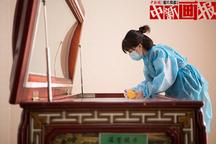- 王岐山外報發文:中國與歐盟應共同反對保護主義

資料圖:國務院副總理王岐山 中新社發 張婭子 攝
中新網5月6日電 中國國務院副總理王岐山5日在《紐約時報》網站發表題為Distant Neighbors(遠鄰)的文章,表示中國與歐盟應在第二次中歐高級經濟對話會上以負責任的態度,明確地做出共同反對貿易保護主義承諾。
王岐山指出,貿易自由化是經濟增長的發動機。它已成為經濟全球化的強大推動力,并使世界各地的人們受益。相反,貿易保護主義維護了一國的利益,卻損害了其他國家的利益,比如導致相互報復,無人獲益。
王岐山表示,中國堅定地致力于改革開放,自中國成功加入世界貿易組織,中國市場變得更加開放,貿易自由度更加放寬。目前,中國的關稅總水平只有9.8%。中國的工業品平均關稅只有8.9%,在發展中國家中最低。進口農產品關稅只有15.2%,這不僅低于其他發展中國家,也遠低于許多發達國家。
王岐山說,中歐兩地經濟可以相互提供更多機會,貿易也有很大潛力。中歐應該充分利用中歐高級別經濟對話這個平臺,加強交流與合作,共同反對貿易保護主義。這將更好地讓我們能夠應對當前的危機,促進經濟的復蘇和增長。
王岐山表示,中歐雙方應當本著合作的精神,妥善解決貿易分歧和爭端。加強對話和磋商,不采取貿易保護措施,避免貿易問題政治化。中國希望歐盟不帶偏見的客觀評價中國的經濟條件,盡可能較快承認中國的完全市場經濟地位。
國務院副總理王岐山在《紐約時報》網站文章英文原文:
Distant Neighbors
By WANG QISHAN
Published: May 5, 2009
The most pressing task facing all countries in the world today is to restore global economic growth as soon as possible. Yet it is worrisome to note that the surge of trade protectionism has made the prospects of the already fragile world economy even worse.
China and the European Union, two major economies and stakeholders in the world, should take a responsible attitude and demonstrate their common, clear commitment against trade protectionism at the second China-E.U. high-level economic dialogue.
Trade liberalization is the engine of economic growth. It has served as a strong propeller of economic globalization and benefited people around the world. On the contrary, trade protectionism — featuring the pursuit of benefits for one country at the expense of others — will only lead to retaliation. It serves the interest of no one.
The world economy paid a heavy price for the prevalence of trade protectionism during the Great Depression in the 1930s, which led to the contraction of global trade by two thirds. We should make sure that the same mistake is not repeated.
Europe is the birthplace of free trade theory, and the E.U. is the product of successful free trade practices. The removal of trade barriers promoted formation of a single European market and enhanced development and prosperity in Europe. As a result, the E.U. has grown into the largest economy in the world today.
China is firmly committed to reform and to opening up. Since its accession to the World Trade Organization, China’s market has become much more open and its trade greatly liberalized. The current overall tariff level of China is only 9.8 percent. Its average tariff on industrial products is only 8.9 percent, the lowest among all developing countries. Its tariff on imported agricultural products is only 15.2 percent, which is not only lower than other developing countries but also far below that of many developed countries.
The openness of China’s trade in services has reached a level close to that of an average developed country. China has taken steady steps to improve its market economic system and legal system. In particular, it has made remarkable progress in intellectual-property rights protection, product quality and food safety, environmental protection and labor security. China has also taken concrete actions against trade protectionism — the Chinese government recently sent Chinese enterprises on procurement missions to Europe and the United States.
The economies of China and the E.U. have much to offer each other and our two-way trade holds a huge potential. The E.U. is now China’s largest trading partner and China is the second largest trading partner of the E.U.
China and the E.U. should make full use of the platform presented by the high-level economic dialogue to strengthen communication and cooperation and jointly oppose trade protectionism. This would better enable us to tackle the current crisis and promote economic recovery and growth. It would also reinforce the trend of economic globalization and facilitates a further growth of two-way trade.
The two sides should work actively to put in place the agreement reached at the G-20 summit in London, promote early, comprehensive and balanced outcome in the WTO Doha round negotiations and uphold an open, fair and equitable international trading regime. An early conclusion of the Doha round is of symbolic significance to curbing protectionism.
The two sides should further open markets to each other. China will continue to lower the threshold for market access, improve trade and investment environment and encourage Chinese enterprises to increase procurement and imports from Europe.
We hope the E.U. will relax restrictions on the exports of high-tech products to China, enhance cooperation with China on the development and application of clean energy, new energy and renewable energy and support cooperation among our small and medium-sized enterprises. Meanwhile, our two sides should step up efforts to update the E.E.C.-China Trade and Economic Cooperation Agreement.
The two sides should work in a cooperative spirit and properly resolve trade differences and disputes. Each side needs to take proper care of its own interests. Yet, more importantly, both sides should accommodate the concerns of the other, taking into full account national conditions and their stage of development, and steadily broaden the scope of our common interests.
We should strengthen dialogue and consultation, refrain from taking protectionist measures and avoid politicizing trade issues. China hopes that the E.U. will evaluate the conditions of the Chinese economy in an objective and unprejudiced manner and recognize China’s full market economy status as soon as possible.
Trade liberalization was, is and will continue to be the only way to global economic prosperity. The Chinese side is ready to work with the E.U. and take effective measures to oppose trade protectionism, promote better growth of China-E.U. trade and jointly move the world economy out of the current difficulties at an early date. (Wang Qishan is vice premier of the State Council of China.)

我國實施高溫補貼政策已有年頭了,但是多地標準已數年未漲,高溫津貼落實遭遇尷尬。
Copyright ©1999-2025 chinanews.com. All Rights Reserved












